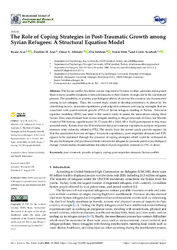The role of coping strategies in post-traumatic growth among syrian refugees: A structural equation model
| dc.contributor.author | Acar, Büşra | |
| dc.contributor.author | Acar, İbrahim Hakkı | |
| dc.contributor.author | Alhiraki, O. A. | |
| dc.contributor.author | Fahham, O. | |
| dc.contributor.author | Erim, Y. | |
| dc.contributor.author | Acarturk, C. | |
| dc.date.accessioned | 2023-04-18T08:04:20Z | |
| dc.date.available | 2023-04-18T08:04:20Z | |
| dc.date.issued | 2021-08 | |
| dc.identifier.issn | 1661-7827 | en_US |
| dc.identifier.uri | http://hdl.handle.net/10679/8119 | |
| dc.identifier.uri | https://www.mdpi.com/1660-4601/18/16/8829 | |
| dc.description.abstract | The Syrian conflict has led to a mass migration of Syrians to other countries and exposed them to many possible traumatic events and stressors in their country of origin and in the resettlement process. The possibility of positive psychological effects of adverse life events is less documented among Syrian refugees. Thus, the current study aimed to develop preliminary evidence for the identifying factors: traumatic experiences, post-migration stressors and coping strategies that are associated with post-traumatic growth (PTG) of Syrian refugees residing in Turkey. Structural equation modeling (SEM) was used in the current study to assess the associations among these factors. Data were obtained from Syrian refugees residing in the governorates of Hatay and Mardin. A total of 528 Syrians, aged between 18–77 years (M = 35.60, SD = 11.65) participated in this cross-sectional study. Results from the SEM indicated that past traumatic experiences and post-migration stressors were indirectly related to PTG. The results from the current study provide support for that the association between refugees’ traumatic experiences, post-migration stressors and PTG appear to be explained through the presence of coping strategies which could be addressed in the psychotherapies and psychosocial interventions for refugees to promote positive psychological change. Future studies should address the effects of post-migration stressors on PTG in detail. | en_US |
| dc.description.sponsorship | Ozyegin University | |
| dc.language.iso | eng | en_US |
| dc.publisher | MDPI | en_US |
| dc.relation.ispartof | International Journal of Environmental Research and Public Health | |
| dc.rights | openAccess | |
| dc.rights.uri | https://creativecommons.org/licenses/by/4.0/ | |
| dc.title | The role of coping strategies in post-traumatic growth among syrian refugees: A structural equation model | en_US |
| dc.type | Article | en_US |
| dc.description.version | Publisher version | |
| dc.peerreviewed | yes | en_US |
| dc.contributor.department | Özyeğin University | |
| dc.contributor.authorID | (ORCID 0000-0003-4007-5691 & YÖK ID 267848) Acar, İbrahim | |
| dc.contributor.ozuauthor | Acar, Büşra | |
| dc.contributor.ozuauthor | Acar, İbrahim Hakkı | |
| dc.identifier.volume | 18 | en_US |
| dc.identifier.issue | 16 | en_US |
| dc.identifier.wos | WOS:000690463100001 | |
| dc.identifier.doi | 10.3390/ijerph18168829 | en_US |
| dc.subject.keywords | Coping | en_US |
| dc.subject.keywords | Post-migration stressors | en_US |
| dc.subject.keywords | Post-traumatic growth | en_US |
| dc.subject.keywords | Refugees | en_US |
| dc.subject.keywords | Syrian conflic | en_US |
| dc.identifier.scopus | SCOPUS:2-s2.0-85113219642 | |
| dc.relation.publicationcategory | Article - International Refereed Journal - Institutional Academic Staff |
Files in this item
This item appears in the following Collection(s)
Share this page




